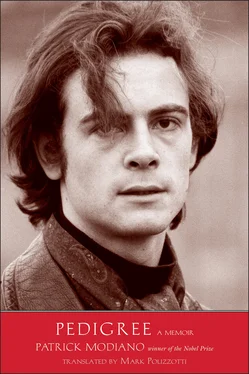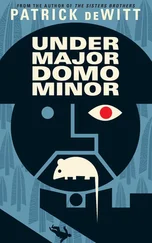On the other bank of the Seine were the mysteries of the Louvre courtyard, the two squares of the Carrousel, and the Tuileries, where my brother and I spent long afternoons. Black stone and leaves from the chestnut trees in the sun. The theater of greenery. The mountain of dead foliage against the foundation wall of the terrace under the Jeu de Paume. We assigned numbers to the alleyways. The empty fountain. The statue of Cain and Abel in one of the two bygone Carrousel squares. And the statue of La Fayette in the other square. The bronze lion in the Carrousel gardens. The green pair of scales against the wall of the Terrasse du Bord de l’Eau. The ceramic and coolness of the “lavatory” underneath the Terrasse des Feuillants. The grounds-keepers. The rumble of the lawnmower engine, one sunny morning, on the grass near the fountain. The clock at the southern gate of the palace, its hands stopped for all eternity. And the fleur de lys branded on Milady’s shoulder. We drew up family trees, my brother and I, and strained to establish a lineage between Saint Louis and Henry IV. At age eight, I was deeply impressed by a film: The Greatest Show on Earth. One scene in particular: At night, the train full of circus performers slams to a halt, blocked by an American car. Reflections of moonlight. The Médrano Circus. The orchestra played between acts. The clowns, Rhum, Alex, and Drena. Street carnivals. The one in Versailles, with bumper cars painted mauve, yellow, green, navy blue, pink … The street fair at Invalides with Jonas the Whale. Garages, their smell of shadows and gasoline. Penumbra. Sounds and voices faded into echoes.
Of my readings at the time (Jules Verne, Alexandre Dumas, Joseph Peyré, Conan Doyle, Selma Lagerlöf, Karl May, Mark Twain, James Oliver Curwood, Stevenson, The Arabian Nights , the comtesse de Ségur, Jack London), I especially remember King Solomon’s Mines , the episode in which the young guide reveals his true identity as the king’s son. And two book titles set me dreaming: The Prisoner of Zenda and The Mystery Freighter.
Our schoolmates on Rue du Pont-de-Lodi: Pierre Do-Kiang, a Vietnamese whose parents ran a small hotel on Rue Grégoire-de-Tours. Zdanevich, half black, half Georgian, the son of the Georgian poet Iliazd. Other friends: Gérard, who lived above a garage in Deauville, on Avenue de la République. A certain Ronnie — I can’t remember his face or where we met. We would play at his house near the Bois de Boulogne. I seem to recall that the moment we stepped through the front door, we were in London, one of those townhouses from Belgravia or Kensington. Later, when I read the Graham Greene story that became The Fallen Idol , I thought that Ronnie, about whom I knew nothing, could have been the protagonist.
Holidays in Deauville in a small cottage near Avenue de la République, with my father’s girlfriend, Nathalie, the airline stewardess. My mother, on the rare occasions when she showed up, used it to entertain visiting friends, actors who were in a play at the Casino, and the Dutch friend from her youth, Joppie Van Allen. He belonged to the marquis de Cuevas’s ballet company. Thanks to him, I saw a ballet that bowled me over, La sonnambula. One day I accompanied my father to the lobby of the Hôtel Royal, where he was to meet a Mme Stern, who, he said, owned a racing stable. What use could this Mme Stern have possibly been to him? Every Thursday, first thing in the afternoon, my brother and I would go buy Tarzan at the news dealer’s opposite the church. It’s hot. We are the only ones in the street. Sunlight and shadow dapple the sidewalk. The scent of privet …
In the summer of 1956, my brother and I lived in the cottage with my father and Nathalie, the airline stewardess. She had taken us on holiday, at Eastertime that same year, to a hotel in Villars-sur-Ollon. In Paris, one Sunday in 1954, my brother and I were standing in the wings of the Vieux-Colombier while my mother was on-stage. A certain Suzy Prim, who played the lead, snapped coldly that we didn’t belong here. Like many old hams, she didn’t like children. I sent her a letter: “Dear Madam, I wish you a very bad Christmas.” What had struck me about her was the look in her eyes, at once hard and anxious.
On Sundays, with my father, we would take the number 63 bus to the Bois de Boulogne. The lake and the floating dock from which one embarked for the miniature golf course and the Chalet des Iles … One evening, at the Bois, we were waiting for the bus home and my father dragged us into narrow Rue Adolphe-Yvon. He stopped in front of a private hotel and said, “I wonder who’s living here now,” as if he knew the place. I saw him in his office that evening, combing through the street directory. I was intrigued. A decade or so later, I learned that during the Occupation, 6 Rue Adolphe-Yvon, a private hotel that is no longer standing (I returned to that street in 1967 to verify the spot at which we’d stopped: it corresponded to number 6), was the address of the black market “Otto Bureau.” And suddenly the stench of rot blends in with the smells of the riding clubs and dead leaves in the Bois. I also recall that sometimes on those afternoons, my brother, my father, and I would hop a random bus and ride it to the end of the line. Saint-Mandé. Porte de Gentilly …
In October 1956, I became a boarder at the Montcel school in Jouy-en-Josas. I’ve attended all the schools in Jouy-en-Josas. The first nights in the dormitory were hard and I often felt like crying. But soon I devised a trick to bolster my courage: I focused my attention on a fixed point, a kind of talisman. In this case, a little black plastic horse.
In February 1957, I lost my brother. One Sunday, my father and my Uncle Ralph came to collect me at the boarding school. On the road to Paris, my Uncle Ralph, who was driving, pulled the car over and stepped out, leaving me alone with my father. In the car, my father told me that my brother had died. I had spent the afternoon with him the previous Sunday, in our room on Quai de Conti. We had worked on our stamp collection. I had to return to school at five o’clock, and I’d explained that a theater troupe was going to put on a play for the students in the school’s small auditorium. I will never forget the look on his face, that Sunday.
Apart from my brother, Rudy, his death, I don’t believe that anything I’ll relate here truly matters to me. I’m writing these pages the way one compiles a report or résumé, as documentation and to have done with a life that wasn’t my own. It’s just a simple film of deeds and facts. I have nothing to confess or elucidate and I have no interest in soul-searching or self-reflection. On the contrary, the more obscure and mysterious things remained, the more interesting I found them. I even looked for mystery where there was none. I lived through the events I’m recounting, up to the age of twenty-one, as if against a transparency — like in a cinematic process shot, when landscapes slide by in the background while the actors stand in place on a soundstage. I’d like to translate this impression, which many others have felt before me: everything paraded by like a transparency and I could not yet live my life.
I was a boarder at the Montcel school until 1960. Four years of military-style discipline. Every morning, flag salutes. Parade marches. Company, halt. Stand at attention. Evening inspections of the dormitories. Bullying by a few senior-year “captains” charged with maintaining “order.” Electric clamor of the morning alarm. Showers in batches of thirty. Fitness trail. At ease. At attention. And the hours spent gardening, when, in a row, we raked up the dead leaves.
One of my classmates that year was named Safirstein. He was with me in the green dormitory. He told me that his father had been a medical student in Vienna when he was twenty. In 1938, at the time of the Anschluss, the Nazis had humiliated Vienna’s Jews by forcing them to wash the sidewalks and paint the Star of David on the windows of their shops themselves. His father had suffered this bullying for a time, then fled Austria. One night, we decided to go explore inside the blockhouse at the far end of the park. This meant crossing the great lawn, and if one of the staff spotted us we could be severely punished. Safirstein had refused to join in this scouting expedition. The next day, my classmates ostracized him and called him a “chicken,” with that garrison-style boorishness that emerges when “the men” are among themselves. Safirstein’s father showed up unannounced at the college one afternoon. He wanted to talk to the entire dorm. He asked us nicely not to bully his son and to stop calling him “chicken.” This way of handling things amazed my classmates, Safirstein included. We were all sitting around the table in the teachers’ lounge. Safirstein was next to his father. Everyone made up in good spirits. I think his father gave us cigarettes. None of my schoolmates gave the incident any further thought. Not even Safirstein. But I had keenly felt the anxiousness of that man, who wondered if the nightmare he had suffered twenty years earlier wasn’t starting up again for his son.
Читать дальше












